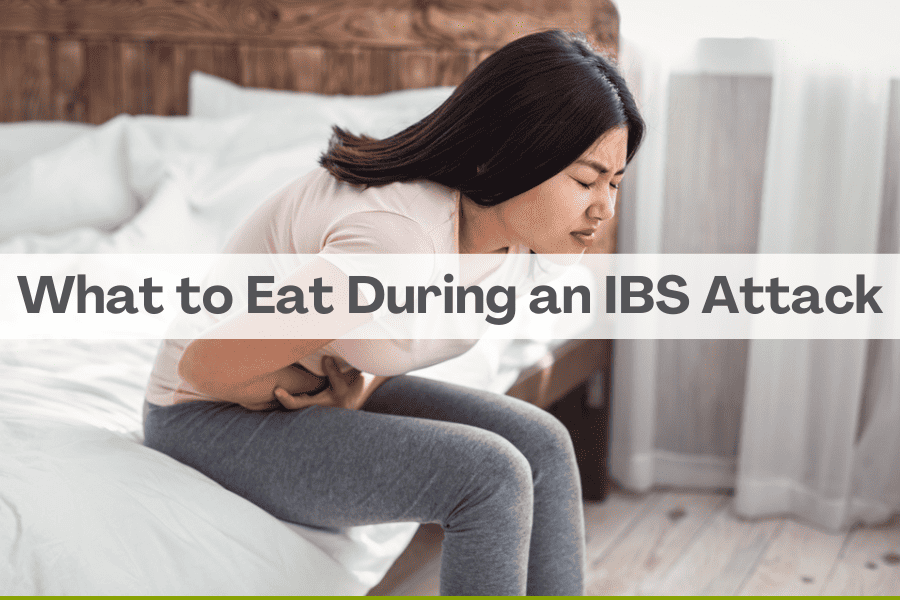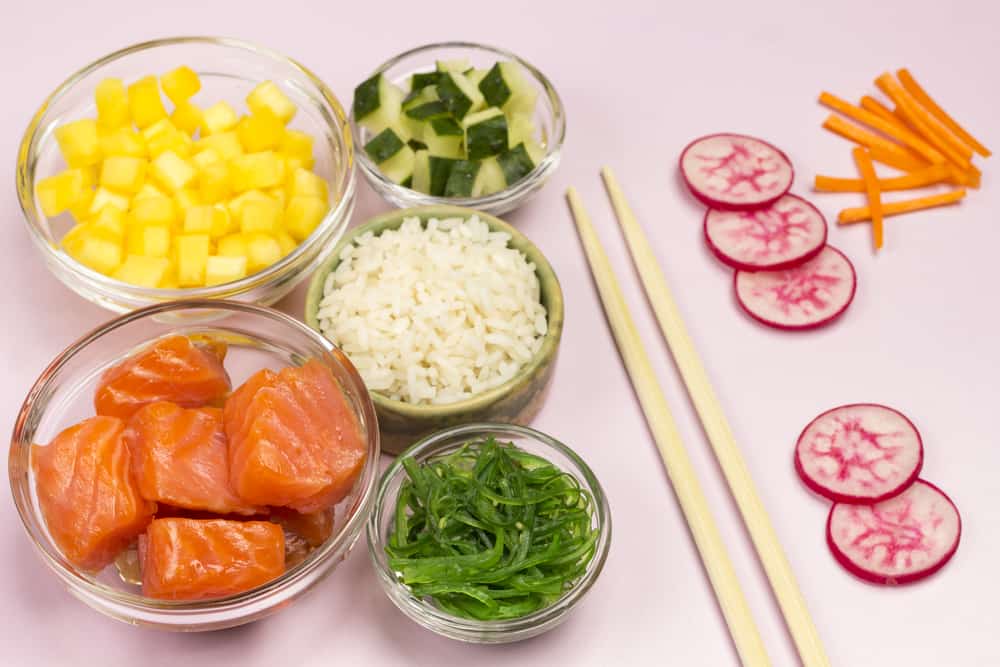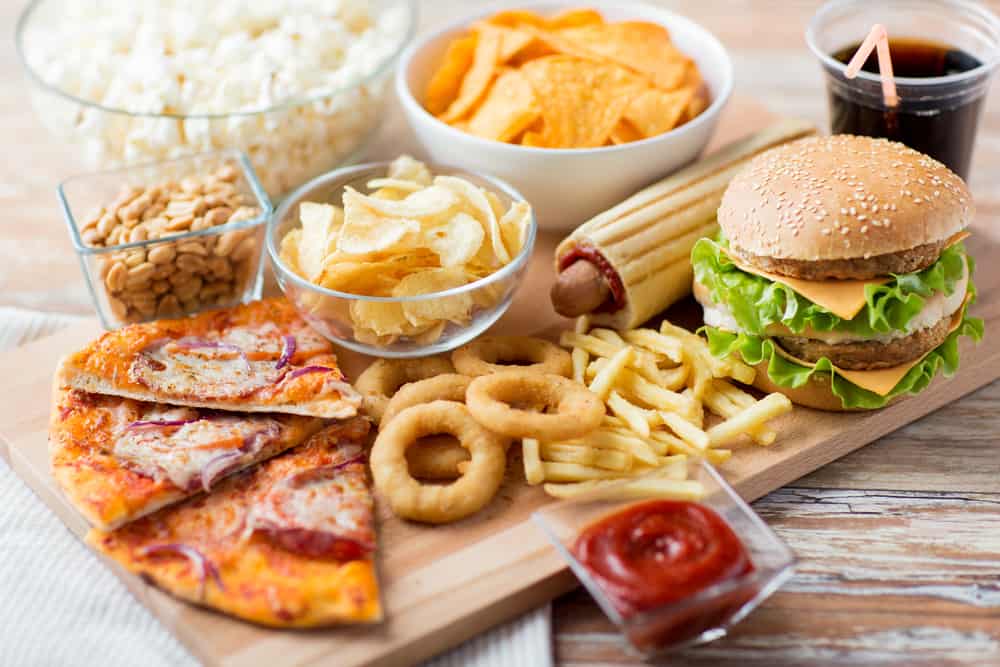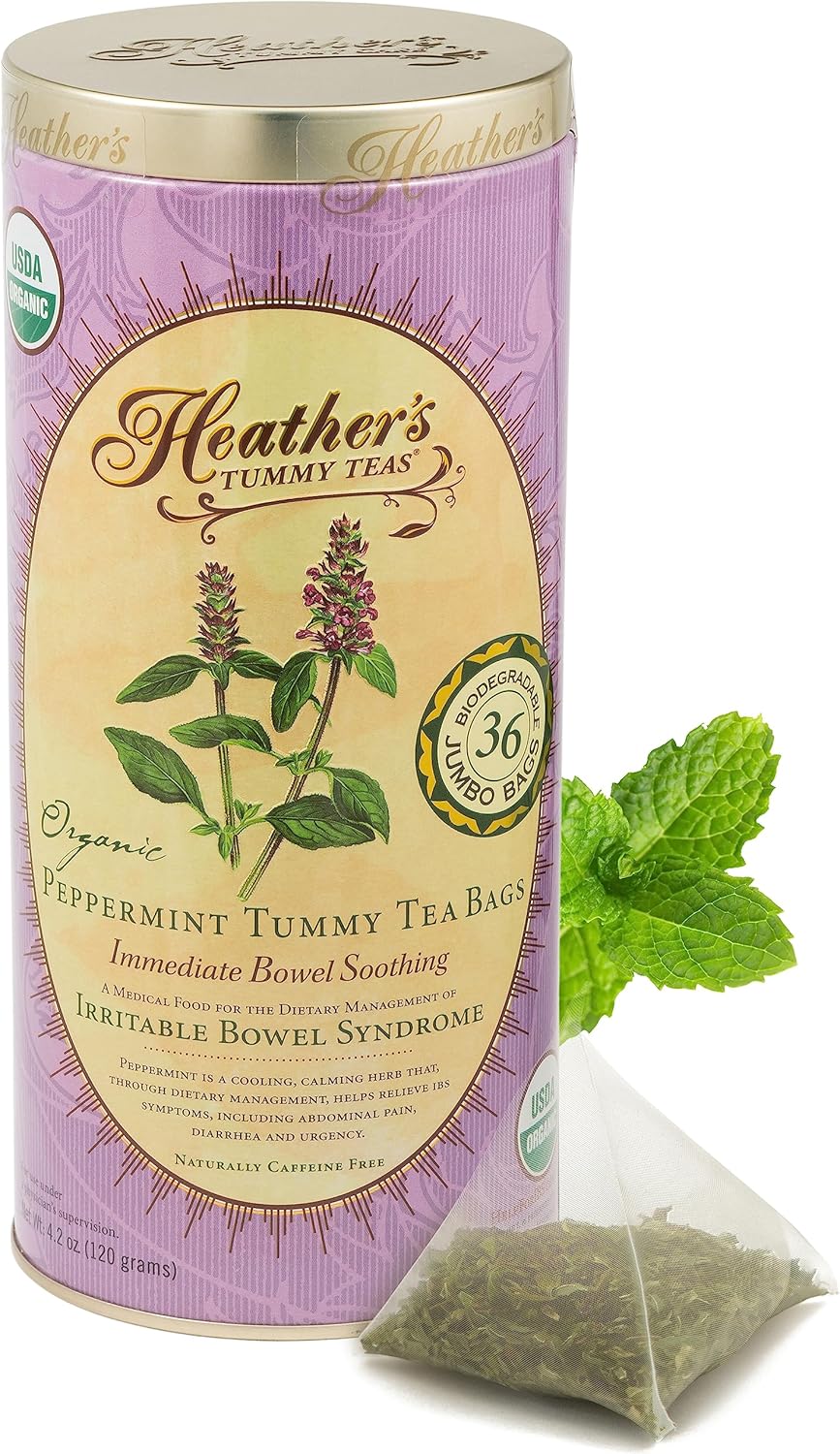Have you been having stomach issues lately and want to know more on what to eat with an IBS Attack? Well, you have come to the RIGHT Place! We also wanted to dive deeper into this topic and learn more of what we CAN eat the next time our IBS attack occurs.

For those of us living with Irritable Bowel Syndrome (IBS), you know how challenging it can be. When an IBS attack happens it can be so incredibly debilitating. The constant need to be near a bathroom at all times makes you feel SO trapped.
But what if there was a way to take control of your symptoms through dietary changes and lifestyle tweaks?
In this blog post, we’ll explore the ins and outs of managing IBS symptoms, focusing on what to eat with an IBS attack, and what to generally avoid during an IBS attack, as well as lifestyle tips and tools for better symptom control.
So let’s dive in and discover how you can reclaim control over your gut health and live a more comfortable life!
This blog post is all about “What to Eat with an IBS Attack.”
Please note that this is our personal account of what has worked for us, so please be aware that results may vary (and consult your doctor or medical professional with any concerns.)
Short Summary
- Understand and avoid IBS triggers to prevent flare-ups.
- Learn about what to eat during an IBS Attack and incorporate low FODMAP fruits/vegetables, lean proteins, soluble fiber into diet for relief during an attack.
- Seek professional guidance for personalized advice on managing IBS symptoms.
Understanding IBS and Its Triggers
When IBS symptoms strike, individuals with Irritable Bowel Syndrome (IBS) experience a range of issues affecting their digestive tract. These symptoms include abdominal pain, bloating, constipation, and diarrhea.
While the exact cause of IBS remains unknown, it’s clear that certain foods and lifestyle factors can trigger IBS symptoms. Understanding your own IBS triggers is CRUCIAL in managing your symptoms and preventing flare- ups. And, since they differ for everyone it is really important to figure out what is causing your IBS attack.
Common triggers include certain foods, stress, and hormonal changes. By identifying and avoiding your personal trigger foods, you can reduce IBS flare-ups and enjoy a healthier, more comfortable life.
Managing IBS Symptoms Through Diet

Let’s explore more on what to eat with an IBS attack! A well-balanced diet plays a crucial role in managing IBS symptoms and thwarting flare-ups.
In general, we have found that eliminating any types of foods or substances that are known to cause irritation is generally the best place to start. Hello, Clean Eating! This generally needs to be done for a set period of time in order to allow your digestive system to properly heal. Once it has healed, then you should be able to (slowly!) add certain foods back into your diet in order to see how your body reacts.
Because of this, people with IBS may benefit from a gluten-free and lactose-free diet due to their pro-inflammatory nature, which can affect the digestive tract. Additionally, it’s essential to be mindful of trigger foods that can cause IBS symptoms to flare up, such as fried foods, high FODMAP foods, and certain fruits and vegetables.
Fiber-rich foods are generally considered safe for people with IBS, as they can help regulate bowel movements and promote a healthy digestive system. However, it’s essential to differentiate between soluble and insoluble fiber, as the latter can sometimes worsen IBS symptoms.
By understanding your food triggers and maintaining a food diary, you can make informed dietary choices to better manage your IBS symptoms and prevent flare-ups.
Foods to Eat on During an IBS Attack

During an IBS attack, certain foods that are non-inflammatory in nature can help alleviate symptoms and provide relief. These include low FODMAP fruits and vegetables, lean proteins, soluble fiber, and easy-to-digest foods such as soups and stews..
In the following sections, we’ll delve deeper into these food groups and provide specific examples of IBS-friendly foods that can support your gut health during an attack.
However, one thing to note is that EVERY single person is different and how they react to individual foods is also very different. These are some recommendations that have worked for us, but you MIGHT react differently. When in doubt of what to eat (or if you need ANY extra guidance), then it’s always best to reach out to a professional (i.e-Functional Gut health doctor, Gut Health Nutritionist, etc.).
Low FODMAP Fruits and Vegetables
A low FODMAP diet, which focuses on eliminating FODMAPS (fermentable oligosaccharides, disaccharides, monosaccharides, and polyols) from your diet, has been shown to help manage IBS symptoms in some people.
Low FODMAP diets can be a game-changer for those of us struggling with IBS, as they focus on foods that are less likely to cause gastrointestinal discomfort. FODMAPs are short-chain carbohydrates that can cause digestive issues in some individuals, and eliminating these foods can help alleviate IBS symptoms.
Some examples of low FODMAP fruits and vegetables include:
- Cucumber
- Blueberries
- Oranges
- Pineapple
- Eggplant
- Carrots
- Tomatoes
- Zucchini
By incorporating low FODMAP fruits and vegetables into your diet during an IBS attack, you can minimize your symptoms and enjoy a more comfortable digestive experience.
Check out some of our favorite low FODMAP breakfast recipes here!
Lean Proteins
Lean proteins can also be a valuable addition to your diet during an IBS attack, as they provide essential nutrients without exacerbating your symptoms. Examples of IBS-friendly lean proteins include:
- Beef
- Pork
- Chicken
- Poultry
- Seafood
- Tofu
When incorporating lean proteins into our meals, we try to focus on using healthy cooking methods such as grilling, baking, or steaming to minimize the addition of unhealthy fats that could worsen IBS symptoms.
By prioritizing lean proteins during an IBS flare up, you can support your body’s nutritional needs without compromising your gut health.
Soluble Fiber
Soluble fiber can play a key role in managing IBS symptoms by promoting regular bowel movements and supporting a healthy digestive system.
Sources of soluble fiber include:
- Legumes (make sure to soak prior to eating for ~2 hours or more to make them more digestible)
- Root vegetables
- Cooked leafy greens
It’s important to gradually increase your soluble fiber intake to avoid triggering IBS symptoms, and to pair fiber-rich foods with plenty of water to support smooth digestion. Also, be sure to peel the skin off fruits and vegetables to facilitate digestion, as the skin can sometimes be high in insoluble fiber and might make symptoms worse.
By focusing on soluble fiber during an IBS attack, you can help regulate your bowel movements and promote overall gut health.
Bone Broth, Soups or Stews
One of the best things you can do during an IBS attack is to eat well-cooked, easy-to-digest foods, which is why bone broth, soups, and stews can be a PERFECT option.
Bone broth is an excellent source of collagen, an essential protein that can help to rebuild and repair your gut lining. This can help to reduce IBS symptoms such as bloating, cramping, and diarrhea. Additionally, bone broth is easy to digest and can be a great meal replacement during an IBS attack.
Soups are another great option for those experiencing an IBS attack. They are easy to digest, and their warm temperatures can provide soothing relief to an inflamed gut. Soups can also be nutrient-dense, making them a perfect way to nourish your body during an IBS attack.
Stews are similar to soups in that they are easy to digest and their warm temperatures can provide soothing relief to an inflamed gut. However, stews tend to be heartier and can contain more substantial ingredients such as meats and vegetables. This can be beneficial for those who need a more filling meal during an IBS attack.
Foods to NOT Eat During an IBS Attack

After reviewing what to eat during an IBS attack, let’s dig a little deeper in what foods we should avoid!
As many or you know, certain foods are known to exacerbate IBS symptoms and should be avoided during an attack. These common irritants include dairy, gluten, sugar, garlic and onions, fried foods, and alcohol, which for many of us are our favorite things to eat!?! (Why is this always the case?).
However, don’t despair. This isn’t necessarily a forever elimination diet. In most cases, if you give your stomach enough time to properly heal, then you might be able to test the waters with these foods and substances in moderation. Again, we HIGHLY recommend consulting a Functional Gut Health doctor or Functional Gut Health Nutritionist for more advice on this topic or a specific plan for your individual needs.
In the following sections, we’ll explore each of these food groups in more detail, discussing why they can be problematic for IBS sufferers and providing alternatives that can help you maintain a balanced and IBS-friendly diet.
Dairy
Dairy products such as milk, buttermilk, cream, custard, ice cream, and cheese can be problematic for IBS sufferers due to their lactose content.
For me, dairy is sadly almost always an issue, IBS flare up or not, and I really think this is the case for so many others too. Mostly because of our body’s inability to digest lactose. Lactose is a carbohydrate that can cause inflammation and difficulty in digestion for some individuals. When lactose passes undigested into the colon, it can lead to fermentation, abdominal distention, and discomfort.
To minimize the negative effects of dairy on your IBS symptoms, consider opting for lactose-free milk, almond milk, or soy milk as alternatives. These dairy-free options can provide essential nutrients without triggering your IBS symptoms.
Gluten
Gluten, a protein found in wheat, rye, and barley, has been linked to inflammation and IBS symptoms. For some individuals with IBS, eating gluten can trigger an inflammatory response, leading to a worsening of symptoms.
To avoid the negative effects of gluten on your IBS symptoms, consider incorporating gluten-free alternatives into your diet, such as:
- Brown rice
- Quinoa
- Gluten-free oats
- Gluten-free pasta
Luckily there are SO many gluten-free options nowadays in almost any market. But don’t fret. If your local store is lacking gluten-free options, then consider shopping online for these products. Places like Vitacost offer great options for gluten-free foods (and often at much cheaper prices.)
By choosing gluten-free options, you can still enjoy a variety of delicious meals while managing your IBS symptoms more effectively on a gluten free diet.
Sugar
Sadly, sugar is also SUCH a trigger for me. I have become so aware of my body and listening to what it wants (especially during an IBS flare up), that I can tell too much sugar is often the root cause.
Sugar, particularly added sugars like high fructose corn syrup, can contribute to low-grade inflammation and increased gut permeability, which can correlate with gastrointestinal symptoms in IBS sufferers. Furthermore, sugar can stimulate the gut to put out water and electrolytes, which can loosen bowel movements and cause diarrhea.
During an IBS attack, it’s important to limit your sugar intake. This includes natural sweeteners such as table sugar, maple syrup, or even honey. Once your system has healed (or your IBS attack has passed) consider slowly adding back in natural sweeteners to your diet, paying close attention to how your body reacts.
Garlic and Onions
Garlic and onions can be particularly troublesome for IBS sufferers, as they contain fructans which are not easily absorbed by the small intestine and can lead to uncomfortable symptoms such as:
- gas
- cramping
- bloating
- constipation
- diarrhea
Therefore, it’s best to avoid these foods during an IBS attack.
Instead, you can use alternative flavorings such as chives, scallions, or other herbs and spices to add flavor to your meals without triggering your IBS symptoms. By finding suitable alternatives, you can still enjoy flavorful meals without the risk of exacerbating your IBS symptoms.
Fried Foods
Fried foods (and fatty foods) are high in unhealthy fats and can aggravate IBS symptoms. Consuming fried foods during an IBS attack can exacerbate symptoms and increase their severity. To help manage your symptoms, it’s important to avoid fried foods and opt for healthier cooking methods such as baking, grilling, or steaming instead.
By choosing alternative cooking methods and avoiding fried foods, you can maintain a more balanced and IBS-friendly healthy diet that supports your gut health and overall well-being.
Alcohol
And for me, yes…alcohol is sadly another HUGE IBS trigger. This is partly why I have been leaning more and more towards non-alcohol adaptogen drinks as part of my “IBS diet” protocol.
Alcohol is a known gut irritant and can lead to or worsen IBS symptoms. During an IBS attack, it’s best to abstain from alcohol consumption, as it may exacerbate your symptoms. Additionally, alcohol can negatively affect the absorption of carbohydrates, further impacting your digestive health.
Instead of consuming alcohol during an IBS attack, opt for non-alcoholic beverages such as water, herbal teas, or even adaptogen drinks (as mentioned above). By choosing healthier alternatives, you can support your gut health and minimize the risk of triggering or worsening your IBS symptoms.
Lifestyle Tips for Managing IBS Flare-Ups
Aside from dietary changes, there are several lifestyle tips that can help you manage IBS symptoms and prevent flare-ups. In the following sections, we’ll explore how:
- Understanding your triggers
- Monitoring your reactions to certain foods
- Keeping a food diary
- Incorporating gut-healing foods into your diet
These tips can help you better manage your IBS symptoms.
Understanding your triggers is the first step in managing IBS symptoms. Keeping a food diary can help.
Understand the Triggers of IBS flare ups
Recognizing your own IBS triggers is essential for better symptom management. While some triggers like stress and hormonal changes can be harder to control, understanding which foods may be causing your symptoms can help you make more informed dietary choices.
One way to identify your personal trigger foods is to consult with a healthcare professional, registered dietitian, or gut health nutritionist, who can provide personalized advice based on your specific needs and dietary preferences.
Alternatively, you can try elimination diets such as the low FODMAP diet, which can help you pinpoint which foods are causing your symptoms and make necessary adjustments to your diet.
Monitor Your Reactions to Certain Foods
Tracking your reactions to different foods can be incredibly helpful in managing your IBS symptoms. By keeping a food diary and noting which foods make your symptoms worse and which ones don’t, you can better understand your triggers and make more informed dietary choices.
Several mobile applications, such as Cara Care, Bowelle, and mySymptoms Food Diary, can help you record information about your food intake, stress levels, bowel habits, abdominal discomfort, bloating, and other relevant indicators to identify which foods may trigger your IBS symptoms.
By monitoring your reactions to different foods, you can make necessary adjustments to your diet and better manage your IBS symptoms.
Keep a Food Diary
Keeping a food diary is a valuable tool for managing your IBS symptoms, as it can help you identify which foods may be causing negative effects. By recording what you eat, how much you eat, and any symptoms that occur after eating, you can uncover patterns and correlations between your food intake and symptom manifestation.
A food diary can be maintained using a notebook, mobile application, or spreadsheet. By consistently tracking your food intake and symptoms, you can make necessary dietary adjustments and better manage your IBS symptoms.
Incorporate Gut-Healing Foods into Your Diet
Incorporating gut-healing foods into your diet can help improve your IBS symptoms and promote overall gut health. Examples of gut-healing foods include:
- Lactose-free milk
- Almond milk
- Lean meat
- Quinoa
- Fermented Foods
- Gluten-free pasta
- Bananas
- Berries
- Chia seeds
- Flax seeds
- Cooked leafy greens
By incorporating these gut-healing foods into your daily meals and snacks, you can support your gut health and minimize your IBS symptoms. Remember to also avoid trigger foods and maintain a balanced diet that supports your overall well-being.
Best Tools to Use for IBS Attacks
During an IBS attack, having the right tools at hand can help alleviate your symptoms and provide relief.
In the following sections, we’ll let you know about some of our FAVORITE tools that we use for managing our symptoms during an attack.
1. High-Speed Blenders
High-speed blenders can be a valuable tool for creating IBS-friendly meals, as they can help break down food more quickly and efficiently, resulting in a smoother texture meal that is easier for your body to absorb. By using a high-speed blender, you can also reduce the amount of time required to prepare meals, making it an ideal choice for those with limited time.
OMG, where would I be without my Vitamix High-Speed Blender. I love it SO much and literally use it EVERY…SINGLE…DAY. Especially during an IBS flare! Are Vitamix blenders expensive, yes! Are they worth it? 100% worth it IMO. I use mine multiple times a day (and have had it for over ten years) and it’s still going strong.
Some meal ideas that can be prepared using a high-speed blender include smoothies, soups, and purees, which can be easier on the digestive system during an IBS attack. By incorporating a high-speed blender into your meal preparation routine, you can create delicious and IBS-friendly meals that support your gut health.
Heating Pads
Heating pads can offer relief from IBS-related pain and discomfort by promoting muscle relaxation and providing pain relief. Applying a heating pad to your abdominal area can help reduce inflammation and soothe the muscles, providing relief from the pain caused by IBS attacks.
Here is one heating pad that I especially like for when I am having stomach pain. It’s not your Grandmother’s heating pad! It has a slightly weighted design and is machine washable too!
To use a heating pad during an IBS attack, simply apply it to the affected area for 15-20 minutes at a time. Be sure not to apply the heating pad directly to your skin, as this can cause burns.
By incorporating a heating pad into your IBS management toolkit, you can help alleviate your symptoms and promote overall comfort during an attack.
Meditation
Meditation can also be a powerful tool for managing IBS symptoms and promoting relaxation. By inducing the relaxation response, meditation can help alleviate pain, bloating, and regulate the hypothalamic-pituitary axis, which plays a role in IBS symptoms.
There are various meditation techniques to choose from, such as guided meditation, mindfulness meditation, and yoga. It’s important to find a practice that works for you and to be consistent in its implementation.
I HIGHLY recommend Dr. Joe Dispenza’s meditations. I have downloaded a few of his and use them over and over and over again.
By incorporating meditation into your daily routine, you can not only manage your IBS symptoms, but also promote overall well-being and relaxation.
IBS-Friendly Teas
These is one of my go-to teas for when I start getting IBS-related abdominal pain. If you aren’t aware of Heather’s Tummy Time products, then you are missing out. Heather is a fellow IBS sufferer and also knows what i’s like to go through the tough IBS times. She has developed a range of products that are legit and definitely worth checking out.
Drinking IBS-friendly teas can help alleviate symptoms during an attack. Some examples of teas that can help manage IBS symptoms include:
- Peppermint
- Ginger
- Rooibos
- Lavender
- Moringa
- Lemon balm
- Fennel
- Chamomile
Each of these teas offers unique benefits for IBS sufferers, such as reducing inflammation, soothing the digestive system, and promoting relaxation. By incorporating IBS-friendly teas into your daily routine, you can help manage your symptoms and enjoy a more comfortable digestive experience.
Peppermint Capsules
Peppermint oil has a natural antispasmodic effect on the muscles of the digestive tract, making it a potential remedy for symptoms such as bloating, abdominal pain, and constipation. Studies have shown that taking peppermint oil capsules can significantly reduce the severity and frequency of IBS symptoms. 
These peppermint capsules by IBgard are ones that I particularly recommend.
To start, these are micro-encapsulated spheres that are less likely to open up on you and cause reflux. They are also an effective natural remedy that doesn’t require a prescription, making it a great option for those looking to manage IBS symptoms. And peppermint oil capsules can improve digestion by helping the gallbladder produce bile, which aids in the digestion of fats.
All-in-all, this is a great product that I HIGHLY recommend.
Seeking Professional Guidance for IBS Management

Although self-management strategies can help you take control of your IBS symptoms, it’s still important to consult with a healthcare professional, gut health nutritionist, or registered dietitian for personalized advice on managing your symptoms and flare-ups.
These professionals can help you:
- Create a personalized IBS management plan tailored to your unique needs and dietary preferences
- Provide guidance on specific dietary changes that may help alleviate your symptoms
- Offer recommendations for medications or supplements that may be beneficial
- Monitor your progress and make adjustments to your management plan as needed
By working with a healthcare professional or registered dietitian, you can ensure that you are receiving the most accurate and effective guidance for managing your IBS.
By seeking professional guidance and implementing the tips and strategies discussed throughout this blog post, you can better manage your IBS symptoms and improve your overall quality of life. Don’t let IBS control your life; take charge and reclaim your gut health today!
Summary
In conclusion, managing IBS symptoms requires a combination of dietary modifications, lifestyle changes, and professional guidance.
Learning what to eat during an IBS attack is crucial! By understanding your triggers, focusing on IBS-friendly foods, and incorporating helpful tools like high-speed blenders, heating pads, meditation, and IBS-friendly teas, you can help control of your symptoms and live a more comfortable life.
Remember, the key to successful IBS management is consistency and a willingness to experiment with what works best for you. So, take charge of your gut health and embrace a happier, healthier life!
Frequently Asked Questions
How do you calm down an IBS attack?
To calm down an IBS attack, we have found that applying heat to the abdomen with either an electric heating pad or a hot water bottle is recommended. This helps to stimulate the blood flow and relax the smooth muscles of the colon, resulting in less spasms and cramps.
What is the low FODMAP diet and how can it help with IBS?
Learning about what to eat during an IBS attack is important! The low FODMAP diet eliminates fermentable oligosaccharides, disaccharides, monosaccharides, and polyols from the diet, which can help alleviate IBS symptoms for some individuals.
What are some examples of lean proteins suitable for IBS sufferers?
Lean proteins such as beef, pork, chicken, poultry, seafood, tofu, or things like flaxseeds and chia seeds might be suitable for IBS sufferers.
These foods are low in fat and high in protein, which can help reduce inflammation and improve digestion. They are also rich in essential vitamins and minerals, which can help boost the immune system and reduce symptoms of IBS.
Remember that each of us is unique and what causes our flare ups is also unique to us. When in doubt, please contact your medical professional.
How can heating pads help alleviate IBS-related pain and discomfort?
Heating pads can reduce inflammation and soothe the muscles, providing much-needed relief from IBS-related pain and discomfort.
What are some IBS-friendly teas that can help manage symptoms during an attack?
IBS-friendly teas such as peppermint, ginger, rooibos, lavender, moringa, lemon balm, fennel, and chamomile can help manage symptoms during an attack.






